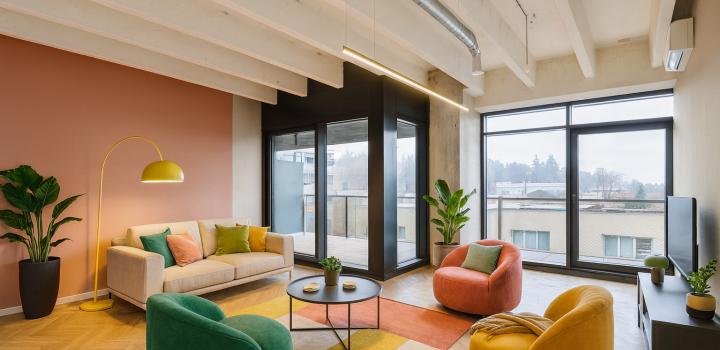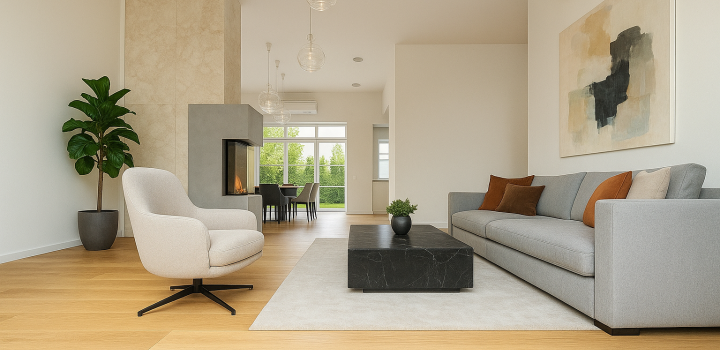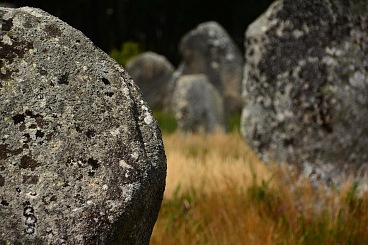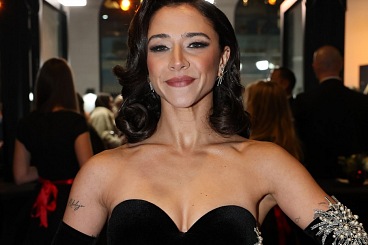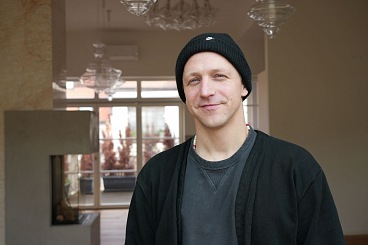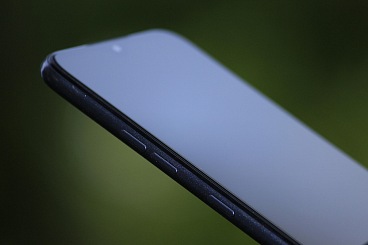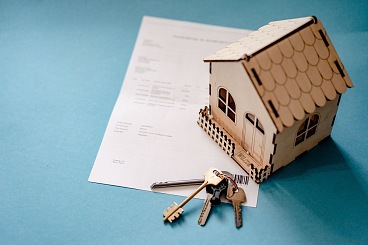Fast Confession - TV presenter Ray Koranteng: We need not only to survive the elections, but also to live it
The moment you meet Rey Koranteng, you feel safe and calm. This kind, smiling and proper man with piercing eyes loves his profession, yet takes it with ease. He has entered many Czech households through the TV screen for many years and is always easily remembered not only for his charismatic smile but also for the colour of his skin. Has he ever encountered ethnic problems? And what does he expect during the election period and how does he view it?
You come from a mixed-race family; your mother is Czech and your father is Ghanaian. You lived a part of your childhood there. Do you remember that time? If so, what was it like?
I don't remember it at all because I was less than two months to two years old. So those memories have faded. I only know from photos that I had a "babysitter." It was a boy, not a woman. He was about fifteen at the time, his name was Ru, and he was in charge of me. Or rather, my mother had him around to help out. And that's about the only thing I remember, but really mostly through pictures. And a white house in the city of Accra on the beach by the Atlantic Ocean, kind of a kitschy place from our European perspective. There were palm trees, sand, white houses, kind of a more upscale neighbourhood.
Have you ever seen your father again?
I haven't, and I won't see him again because he died two or three years ago. It's been a long time. So we haven't really met anymore. But I do have some family there and I'm still in touch with them, we text each other via whatsApp when someone is getting married. They often ask if everything is okay here. Every time something goes wrong here in the Czech Republic, they want to know what happened. For many years they thought Prague was a country. They don't know the Czech Republic, maybe Czechoslovakia, but even that not much, really. So I had to explain to them that Prague is a city. There is a lot of BBC coverage there, because it has a long tradition, from the colonial times, and whenever there is a big problem in the Czech Republic and the BBC is broadcasting it, they call me right away. Whether it was during the COVID wave or when the shooter went on the rampage in the hospital in Ostrava. They always ask me what's going on here and say, "We're watching this and it's a terrible place!" I explained that these were extremes, that otherwise, it was a peaceful, beautiful country.
You have lived in a harmonious marriage for many years. At a time when many marriages are breaking up, do you have any tips on how to go about it?
I was trying to calculate in my head how long I've been married right now. Since 1995, that means it has been 26 years this July. I don't have a recipe for it. As Meryl Streep said, "Take that step and ask God for mercy." And it's true. There's no recipe for something like that. We're all different. So far, everything has been working at home, and I wish it would continue to do so, knock on wood.
You graduated from the CEVRO Institute, majoring in political science and international relations. Why did you choose this particular field and what attracted you to it?
I was a strange kid, because I liked to watch the TV news already back during the communist times. Back then the programme was called „The TV Newspapers,“ it ran from seven-thirty PM on Czechoslovak Television and I mainly followed international politics. How the Americans were moving the Pershings, medium-range missiles, and how they were fighting a war somewhere, at that time it was the Soviet War in Afghanistan. I was always fascinated by that. Then life went on, and politics went on with me. Purely in theory, I could never have been a politician, God forbid, but politics just interested me. When I was deciding what I was going to do next in life, I thought, "It should be political science." A friend of mine actually turned me on to it. In my undergraduate studies, there was one combined major in political science and international relations, and then in my master's studies, it was just political science alone.
Did you enjoy this school and did it meet all your expectations or was there some disappointment?
No, I wouldn't say disappointment. I made a lot of friends there, to this day we still meet several times a year. We are from different parts of the country. We go together regularly on weekends to the wine cellars in South Moravia and to South Bohemia. When someone from outside of Prague comes to Prague, we always meet and they come to see me at work. I've made a lot of new friends for life there, it's been some years after all and it's still going strong. It's proof that it's a time-tested relationship.
Do you have any emotionally strong personal experience that characterizes your student years?
There's a lot of them. There are many small experiences, but a really strong experience? That would be a shock, but there were many small experiences where I always looked forward to lectures. Many of them ended in applause, which I don't think is quite usual. There were some big names lecturing there, which are still big to this day. Some we know today, for example, as constitutional judges or judges of the Supreme Administrative Court. For example, I was taught constitutional law by a person who is now a constitutional judge. So really, these are people who are making a difference in their field today, which, after all, their career progression proves. Those are the rare moments. And maybe there's one more. I had one elective course called the History of conservation and it was taught by Mr Ing. Ševců. At that time, if I'm not mistaken, he worked at the Institute of Monuments, he might even have been the head of the Institute in Prague. Architect-engineer Ondřej Ševců, who told us about the history of Prague and architecture in the Czech lands in general in an incredibly engaging way. That was always so intellectually uplifting. Even though it was quite far away from political science, it was about culture. And culture and politics are related.
If I'm not mistaken, it's been some 17 years since you first appeared in the media world.
Well, it's more than that actually, that was in 1994. I was a weatherman on Nova for five years.
I wanted to ask you about that too, how did you get into the profession of weather anchor?
It was in 1994, or 1993, when TV Nova was not yet broadcasting at all, but the project was already in the pipeline. I was working at Meteopress at that time as an assistant to Mr. Kračmer, who was the director, and it was him who brought these projects to the then non-existent TV Nova. It was located in various places around Prague, and it was still being built as a television station. It was there that I came into contact with the then news director, Mr Vávra, and with Jirka Bendel, the producer. They found it interesting that I spoke completely pure Czech, actually Prague Czech with an accent back then, and on top of that, I was dark. And so the idea arose that I could do something for them. I got it wrong, and to make a long story short, I was simply asked if I wanted to do the weather. And because Meteopress manages weather information and I was close to it, I said yes at the time. So in 1994, at the start-up, the channel started broadcasting on February 4 and I started anchoring on February 7, it was a Monday, I actually entered public life then. It's been, I'm doing the math now, 27 whole years, am I right? It'll be 28 in February, if I live to see February.
It was actually your first time in front of the camera, what was it like and how did you prepare for it?
It was terrible, and I prepared for a long time. Back then everything was approached really genuinely, we were downright grinding and I was studying meteorology. Alena Zárybnická, who now works at CT as a meteorologist and people certainly know her, explained meteorological concepts and many other things to me for hours on end. We did camera rehearsals, back then it was done with the chroma key (green-screen), now it's back in the real environment. Back then, what was modern was the green screen, which is basically a very primitive virtual reality. You have to learn how to navigate it. It was horrible, but I remember it fondly, even though it was exhausting. I don't think I could do it now, all these years later, I'm twenty-seven years older, too. For example, I went to work at ten o'clock on a Tuesday morning, came back at eleven o'clock on Wednesday morning, and I didn't find it strange. We had a certain strength back then; the 90s were special, it was absolutely free and people were excited to create something. I think that's what rubbed off on us. I guess it's different now.
You mentioned that you were noticed for the different color of your skin, what effect did that actually result in? Were there positive reactions or were there some negative reactions as well?
There were negative reactions for sure, but television kind of shielded me from that. I was told at the time, and it was very straightforward of them, and it's still true today, that the public favour is fickle. They said if it doesn't work out for various reasons, if you struggle, or if people don't relate to it somehow, you can be pulled out overnight. And I said I'd give it a try and I took it as an interesting and wonderful life experience. They were completely honest about that. So I'm sure there were some negative reactions, and I'm sure there still are to this day, because it would be naive to think that there wouldn't be. But television always, and to its credit, tries to shelter the person from those outside influences so that they can focus on what's being asked of them. And you're asked to do some work, some performance. And the bad reactions are the very things that would distract you from that.
Have you ever encountered certain signs or manifestations of racism in your professional or private life?
There is a big question about what we actually call racism here – unlike in the Western world, we are not quite clear about it here, because we have no experience with it. Their experience is different and probably not transferable. So we recognize some rudeness here, but that’s something everybody encounters. You don't have to be black; it could be that you're fat, a redhead, or wearing glasses, it’s not just about different skin color. I've encountered that, of course. But racism as an ideology, that you're forbidden to do something, I don't think we have that here, or I hope it's not the case here. I haven’t experienced that, it didn’t exist for me here, and I never encountered that I wasn't allowed to do something because I was black, that I wasn't allowed to go somewhere or that somebody would deny me a job. On the contrary, when I started working for Dr. Kračmer, he was like a dad to me; he took really good care of me in that career sense. He directed me, because I was in that idle age, a little bit, so to speak, directionless. He would say to me, largely jokingly, "You know, I'm actually employing you because it's a certain advantage to me, everybody remembers you and if they remember you, they remember my company." So it's actually kind of, in quotation marks, inverted, and in a good way. That's why I'm somewhat sensitive when somebody starts talking about racism in the Czech Republic and I always say it's similar to when somebody starts talking about justice. Who gets to draw the right line, since people always tend to define it for isolated cases only. So, yes, it can happen to anyone for any reason, but the evil racism as we know it from American movies, for example, doesn't happen.
So we’ve covered your adulthood. But did you experience any hints of racism as a child? Or was it just about the difference? Kids can be unpredictable. Perhaps it was the other way around, and girls fancied you more than other boys when you were a teenager? Or was there never anything like that?
In childhood, of course, yes. What I call rudeness, meaning kids shouting some rude things, that was happening, yes. Or this certain kind of curiosity, like "Oh, look, a black guy, and he speaks Czech". That makes a kid uncomfortable. But my classmates never had a problem with it. Or at our cottage, which is in a small village, they always called me "that Růžička’s kid" because my great-grandmother married Mr Růžička, a local farmer. All of the old-timers and their children there always said, "That's young Růžička." So if someone says that the town is tolerant and the village is conservative, that's stupid, it’s the other way around there. Life is much more complicated than that. And then in my teenage years, there were of course some advantages, and sometimes it roused interest in girls. It's all just little things and it's not a big deal. Of course, when I went somewhere, everybody turned to me, obviously – if you're a black man among white men and you're different, they look at you. But that's not an expression of some kind of racism or impoliteness. It's just a natural human trait. If a person who weighs half a ton walks into a room, you're going to look at them too, because it's a certain kind of experience.
You've been presenting TV news on TV Nova since August 1999, how did that come about? Who approached you and why? Was it a big change for you? And what were your beginnings with the primetime show?
This is what Lucka Borhyová remembers best. To me, it's already kind of blurred, women are better with dates. She knows it exactly, I think she said it was August 5th. Anyway, sometime in June, Věra Dušková came to me and said that she needed to talk to me, that they would like it if I did this programme with someone called Lucka Borhyová, I didn't know who she was yet. We were just passing each other in the hallway, but we didn't know each other any closer, I think we never even got to talk. So she asked whether I’d try the TV News for some temporary period and I said: "Well, like... honestly..." and I took a week to think about it. First of all, I was wondering what would happen after the transition period. I was relatively young, and I think you're supposed to have people with some life experience in the newsroom because it's very much about life, however that's not to say that you're supposed to be old or that you can't have a young person there. I was 25 years old at the time. I gave myself those 2 weeks to think about it and then some other things happened and they explained what their intention was, that the main anchors couple would come in then. In the end, I agreed to it, I thought it would be an interesting experience, although it was never my ambition. I never wanted to work in television, I never went to any auditions, I'm a shy person, even though nobody believes me when I say that. I just happened to walk in on it, so to speak. But I'm a curious person and I like to learn new things, so I've consulted a lot of people and some said, "It’s bullshit", while others were like "Hey, that's not bad, you're not gonna get a second offer like that." So I said yes, it's my decision after all. I took them up on it, and the Lord enlightened me.
What's the biggest tongue slip you've ever made?
I don't know what was the biggest, I don’t think there was any in the TV news, just the regular kind of things that sometimes happens, it can happen. When I was still doing the weather, I said... and I still remember that, people would stop me and pat me on the back for it. I said that some biometeorological forecast would affect the orgasm of asthmatics, instead of the organism. It was such a big deal at the time. So that happened.
During your career at the Television News, you had three female colleagues by your side. Lucie Borhyová is, of course, a regular, but during her maternity leave, you also had Michaela Ochotská and Kristina Kloubková as colleagues. How did you perceive their energy? Was there any difference in working with each of them? Or does one always have to adjust gradually and "fine-tune", as they say?
We basically never had to attune any further, there was always a beautiful woman there, I have the advantage that they always put a stunner next to me. I actually knew Kristina before and Míša as well, so it wasn't the first time I met them. I even hosted something with Míša Ochotská, back when we still starred together in the soap "Pojišťovna štěstí" ("The Happiness Insurance"), so it wasn't exactly like meeting a stranger. Everyone is different, that goes without saying, but it's always been nice.
Does working at TV NOVA feel any different in the era before and after Vladimír Železný? In the 1990s, the newly emerging TV NOVA was a big surprise on the television market and experienced a certain boom, so to speak. It was something completely different then; I mean not only for the viewer, but also to work under the leadership of this man.
The technology is different, it’s almost like two different, incomparable worlds. Nowadays, everything is "digital", while back then almost everything was "analogue", but the atmosphere, the genius loci that just resides in the corridors here, that hasn't changed. A lot of my former friends who have left say they are actually sorry. Whether they left for better or for worse, it could even be that somebody felt unappreciated and maybe left demonstratively. You'd think in retrospect they might have a tendency to say: "Look how good I did to leave." But privately, these people have always told me that they miss those people in a way, because there's such a special atmosphere here. It's hard to describe. In directing, for example, the technicians who have been with me since the beginning, that's not just a colleague anymore, they’re almost like a family to me. It's not that we know everything about each other, not at all, but there's this particular atmosphere of connection, togetherness in destiny. We're in the same boat, and when it’s a successful boat, you also have a lot of rivals, which brings people together and unites them.
We’re nearing election time, do you go to the polls regularly and will you go again this year?
In this regard, I may seem like a weirdo for some people, but I actually like elections and for many reasons at that. First of all, I'm a democrat by nature, and elections come naturally with that, but secondly, it's simply a tournament. It's a battle of politicians, I wouldn't even say political parties, because the party is just a shell of sorts, but it's a battle of the people inside of them. A battle of characters and faces. Unfortunately, it leaves some people cold. I always say, "You watch football and get all nervous about that. What's the point anyway? One wins, the othr loses. So what?" I've got two brothers-in-law, great guys, they're like brothers to me. When the football is on, they each support a different club, and what’s more, these clubs don't even get along with each other, it's like a little war. And I'm like, "What's the big deal?" Then there's an election where something’s really on the line and a lot of people say, "My vote won’t change anything anyway." I just like elections, I go to the polls regularly, even though I can’t say that I always vote for someone with a clear conscience that I made the best decision. It's always a bit of a gamble in a way. But I still say, "People, go to the polls."
Did you already pick a party as your favourite? And if so, why?
I have a colleague here who is also very interested in politics, and so we kind of tease each other and make private bets on who's going to get what percentage, who's going to get in and who's not going to get in, so I do have some picks. But, of course, I am not allowed to say what they are, I cannot and do not want to say, because from my position I simply cannot influence anyone or their decision in any way, positively or negatively.
You have moderated political debates in the past. What is that like? Did it influence you, for example, in what party you ended up choosing?
It was a new experience for me, so of course, in the beginning, I was tense about it, but as time goes on it I feel less and less tense. It's always a conversation. Politicians are pros; they're in it all the time, from morning till night, often for years, and they get prepared for it, so it's hard to compete with them. But it hasn't affected me in any way. You might like someone as a person, but you don't agree with their views. And I always tell people that just because someone votes for this person and another person votes for that person doesn't mean we should be enemies. Democracy is about everyone thinking differently without consequences. It's about the art of compromise. That's why I don't like to talk about, for example, the division of society. People just have different opinions, and that's good, the important thing is that we don't fight. Someone is simply more likeable to you, someone is less agreeable, but then again, some of the views and values he mentions are closer to yours.
Will you be moderating the political debates this year?
It's in the pipeline, but the COVID can always throw a wrench in the works. I have never planned much, and now that there is COVID, even less so, maybe three days in advance, if that. We are planning a debate, or more precisely, several debates, and TV Nova is fully committed to it. My colleague Bára Divišová should be doing one, and I should be doing one, and then there is the Saturday election broadcast. I like that, it's quite a "ride", it takes several hours. Now the last time we did the American elections, it was at night, so we went for 7 hours straight, and now it might be even more. We want it to be fun for people and for them to learn something. Elections should be a celebration of sorts, so why not do it differently? We have guests invited, and as I said, I don't want to give away the details, but this I can give away. I have reached out to Mr Paroubek and Mr Nečas, former Prime Ministers, because they are both interesting personalities. It doesn’t matter whether you agree with them or not, but I think they still have something to say from behind the scenes. Also Bohumil Pečinka, who I think is one of the best pundits in the country, so I hope it works out and COVID doesn't blow it for us. And that none of us will get sick or have to quarantine ourselves, that's always such suspense.
A lot of political parties built their campaigns around the theme of "fear of migrants" in the last elections.
I cannot publicly comment on specific campaigns at the time of the election campaign. That is a question I, unfortunately, cannot answer, although I do have an opinion on it, of course. We can talk about it after the elections, but it is not possible during a "hot" campaign.
You are quite busy with your work and your family. Do you also have time for some of your hobbies? Can you tell us what you like to do in your free time and why?
I actually have quite enough time for myself, or at least my wife tells me so, but now when I think about it, I don't really know... I regularly play chess every morning at breakfast with a friend over the internet. I play badminton with another friend, but now COVID has thrown a bit of a wrench into the works. We got back to it again though, as soon as we could. When I say badminton, some people laugh that it's a girl's game, so I always say, come and see for yourself. I used to play netball, but I can't do that now, because I'm actually finishing work in the evening, and by then all of my friends are home, slowly getting ready for bed, as they have to go to work in the morning. I have this reversed daily routine, where I’m only free in the mornings and never in the evening. I also like riding my bike and, of course, everything regarding flying. I fly, well now I'm more talking about it than actually flying, because there's no time for it. I'm also interested in planes from the technical point of view. Then I also like history, the ancient times. And when I say I like ancient history, I have to add that I also like the Middle Ages. Even 20th-century history, we draw lessons from that. Although a political scientist would say we've been drawing out lessons at least since the Napoleonic Wars or even the Thirty Years' War, in the sense of political development, that is. Everything is connected, even in history. History is just my hobby as well. Knowing the past gives us a kind of chance to understand the present.
Do you have a new project coming up at the moment? Do you have anything to look forward to, will you surprise us with anything?
There's so much going on right now. I performed in a short role in the Husa na provázku (Goose on a String) Theatre in Brno. During the COVID, the guys were filming kind of a short series there. It's supposed to be fun, so I'm in there with a teeny-tiny part, for about five seconds in total. Today I got a call that there's a premiere on Friday, but unfortunately, I can't go because I'm at work and I can't make it. So that's one thing. The second thing we are working on is a project that involves, to call it right... I don't really want to give away the full details, but it sort of involves a bit of new technology and a change of approach to energy and motoring and things like that. We are approaching it from quite a practical point of view. Then the elections, that's one big thing. I won’t really be doing anything other than just the election until then. I've got to try not to contract the COVID, I've already had it and I'm vaccinated, so hopefully I'll be OK. And then there are other things, there are some other roles waiting for me, but won't happen until the election, so I'm leaving it open now because no one knows what's going to happen in October.
Are you a patron of a charity organization or do you support any such project?
I have been for years, they remember it better than I do, but lately I've checked the dates on purpose. I've been a supporter of "Dobrý anděl" ("The Good Angel Project") since 2013. We'll actually be shooting new spots tomorrow for a new campaign for next year. See, I completely forgot, speaking of which, that's tomorrow morning. I'm sending money in and I'm also helping out by filming spots with my colleague. I'm glad that it always hits the spot, that there are always more contributors after each campaign. This foundation simply makes sense to me, because it financially helps families with sick children and all the funds are distributed to them. The organization itself doesn't use up anything, all the money, down to every single crown goes to them and you can set an amount you send in each month. I don't know if there's a lower limit, but I think if you basically send a hundred crowns in there, and now don't take my word for it, maybe it's some other minimum amount, that even that helps. It's based on the idea that the more people contribute in small amounts, the bigger the final amount. It’s nice, I've met people through it that were sick as children and are now functioning adults, so that's good. I also work with a foundation that helps seniors stay active here in Prague. This is a group of seniors who would normally be on kind of a "house arrest", as they have nowhere to go. So for example, they organize group walks for them, a walking race through Prague's forest parks, or various excursions. We even went to the Cosmos Discovery exhibition at the Holešovice Exhibition Centre together with their grandchildren. But then the COVID put a stop to it again, so it moved online for the most part, but now it will hopefully start again.
Thank you very much for taking time for our magazine, may you have the best possible elections experience and plenty of free time as well.
Thank you as well; it's been enjoyable. Of course, it's important to survive the election, but also to live it, I look at it like a hockey or football game. It's just all in all interesting – and let’s hope this autumn will be merrier than last year.
Fast confession:
What gift would please your wife the most at the moment?
What kind of humour do you like?
Who's your greatest idol?
Do you have a tip for the next president of the country?
What attracts you to women at first sight?
If you could "teleport" right now, where would it be and why?
Your favourite Czech politician at the moment?
Which word describes your character?
Can you forgive when someone disappoints you?
Who was your most enjoyable partner on the News?
What would you like to improve about yourself?
Which politician was the most difficult to debate with and why?
Which one word would you use to describe the Czech political scene?
Who/what do you trust completely in life?
What's your favourite color?
I was hoping you'd say black.












